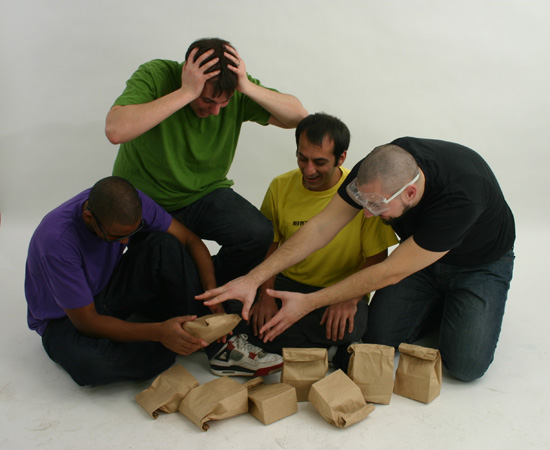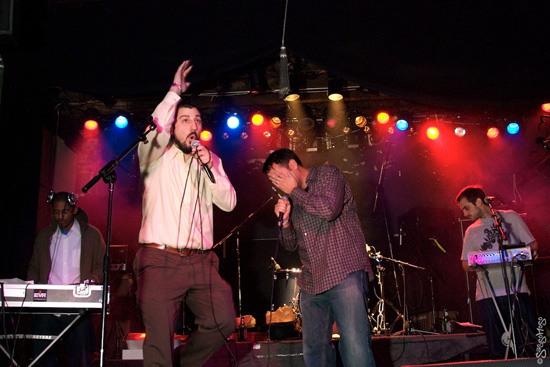SpearTalks: The Hoarsemen

Countless new hip-hop acts are loved for sounding like they came out 15 years ago — turning modern rap into an ironic party favor. Because ingenuity is rare, those looking for quality in boom-bap dig back. That’s what the Hoarsemen are doing. The sensibility of this four man group from New York-by-way-of-New Brunswick, NJ is not a throwback, or a style shift … or an adherence to a style. It starts from scratch.
With their debut album Snacks and Catastrophes out for about a year now, it’s a cure for the common record. But their live shows are what they stake their reputation on. The goal isn’t simply making interesting music, but to create an engaging performance to go with it. I’d always hoped someone would redefine hip-hop in some form without attempting to redefine it at all, and the Hoarsemen have delivered on this wish.
The producer of this outfit, Sonny Ray, lays down beats on an MPC and supplements sample cutting with his own instrumentation. MC Long Division delivers bars in a clean voice and a rhyme style fortified with hidden metaphors. Loosie, a vocalist with an original voice, grinds out dirty hooks contrasting with Long Div’s orderly flow. Cuts from outer space come courtesy of DJ Dialect. Together, it sounds a little bit like this.
We sat in Sonny Ray’s LES apartment — also home base for production of the band’s tracks — over home brewed beer and pizza, where we talked the story out.

JS: What’s the origin story behind the Hoarsemen?
HM: We’ve all been friends for ten years. [Sonny Ray and I] had a group in New Brunswick called the Mercenaries. We used to do the open mics out there and college radio and stuff like that. We worked on the project on and off and did a handful of performances. It involved the two of us and two other MCs, but occasionally we would collaborate with Loosie. Loosie was not a musician by any means. It wasn’t like Loosie came into the group saying “‘I’m a vocalist.” It was more like we were telling him “You have to perform with us.” We were at a party and Loosie was alone with Sonny’s equipment and sort of singing into the mic, and we thought, “this is amazing.” This other kind of formative thing that happened in that in between time when we were in college was a house song that [Sonny] produced with Loosie. It was called Tishiate. Like"¦’You know I love you girl/But you don’t tishiate it.’
JS: What’s the production process like?
HM: With a couple of exceptions, it usually starts with a beat. Long Div always rewrites the rhymes several times. We work as a machine, and to that end we treat each other pretty poorly. We’ll tell each other “You suck. That sucks”, until it’s good. We’re hard on each other, but if you really want to be collaborative, you have to get past that pride. That’s how we operate.

JS: Before I ask you about your live act, what do you think of live hip-hop shows nowadays?
HM: [Laughs] They suck. Is that what you want to hear? If you take a step back and focus on what’s actually going on, it’s not good. Everyone is cheering for who they came to see no matter what and they’re on stage asking people to chant along, and the sound is usually terrible and there’s really no actual music occurring. It’s like a pep rally.
Does that reflect on what’s wrong with hip-hop nowadays?
HM: The problem with rapping is that it’s basically talking. And we all talk. So in a sense, we all rap. So you get a lot of rappers. [Laughter] And too many cooks spoil the broth.
JS: How do your shows differ from the other stuff that’s out there?
HM: We perform as a band, where the actual music that’s being produced at a show can hold up in some aesthetic context. A lot of live shows are lazy and the only attempt to engage the crowd is to yell at them. You should be inspiring them to behave a certain way rather than telling them what to do. If we’re gonna perform for somebody, there should be some entertaining aspects, it should be interactive, and it should be fun for everybody; for us to do and for them to watch. Not that the music is secondary to that, but that it’s augmenting that.
An identity choice for us is that it always sounds like a band. We’re all musicians and it’s more like a four-man rock band unit. A lot of times at hip-hop shows, cats will be rocking iPods. The devaluing aspect of that is that’s just information being pumped through the sound system rather than it being musicians creating the music and focusing on the performance. When we play, there’s something occurring. There’s synergy. It’s not just someone reciting a memorized speech over a canned beat, which is what most shows are like.
Sonny has a vintage piece of equipment [MPC 2000] which he uses live, and it takes it a minute to load tracks while we’re performing live, which is when Dialect will play some filler tracks. It’s caused a certain rhythm to emerge in our sets and we used to lament it, but it’s led to some interesting things, like the ukulele bit and some of the magic tricks we do live, throw fireballs around and stuff like that. It’s very vaudevillian.
JS: What’s next album-wise?
HM: We’ve actually been doing a lot of branching out with our new material. We’ve got an Irish drinking song. We’re just gonna save up for a new album. We’d rather do an album than five mixtapes. Something that’s more lasting. Something that holds value is that we want to be comfortable with what we present, even if it isn’t the move in certain industry types of worlds. We want to be in control of what we’re doing without being limited by what we need to do to sell records. We want to be comfortable with our record as listeners. So many artists now are opportunistic and just want to get their name out, and the actual art becomes incidental. With us it’s the opposite.
